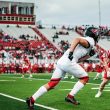Myron Scholes, the Nobel prize winning theorist, and co-developer of the Black-Scholes theory for pricing risk, was interviewed by the New York Times last week, to discuss, among other things, Black Swan author Nassim Taleb's recent thoughts on his risk pricing model. Here is an excerpt:
Q: In retrospect, is it fair to say that the idea that banks could manage risk was a total illusion?
A: What you're saying is negative. Life is positive too. Every side of a coin has another side.
Q: The writer Nassim Nicholas Taleb contends that instead of giving advice on managing risk, you "should be in a retirement home doing sudoku."
A: If someone says to you, "Go to an old-folks' home," that's kind of ridiculous, because a lot of old people are doing terrific things for society. I never tried sudoku. Maybe he spends his time doing sudoku.
Q: Some economists believe that mathematical models like yours lulled banks into a false sense of security, and I am wondering if you have revised your ideas as a consequence.
A: I haven't changed my ideas. A bank needs models to measure risk. The problem, however, is that any one bank can measure its risk, but it also has to know what the risk taken by other banks in the system happens to be at any particular moment.
Q: What good is a theory of risk management if it applies to one tree instead of the forest?
A: Most of the time, your risk management works. With a systemic event such as the recent shocks following the collapse of Lehman Brothers, obviously the risk-management system of any one bank appears, after the fact, to be incomplete. We ended up where banks couldn't liquidate their risk, and the system tended to freeze up.
Also, as a addendum to this, Michael Lewis, bestselling author of Liar's Poker, wrote an in-depth piece about the flaws in Black-Scholes theory in Portfolio Magazine. Here is an excerpt:
…Black-Scholes didn’t work; trillions of dollars’ worth of securities may have been priced without regard to the possibility of crashes and panics. But until very recently, no one has bitched and moaned about this problem too loudly. Lay folk might harbor private misgivings about the clergy, but as lay folk, they are reluctant to express them. Now, however, as the subprime market unravels, the beginnings of a revolt against the church seem to be taking shape.
…One of the revolt’s leaders is Nassim Nicholas Taleb, the bestselling author of The Black Swan and Fooled by Randomness and a former trader of currency options for a big French bank. Taleb can precisely date the origin of his own personal gripe with Black-Scholes: September 22, 1985. On that day, central bankers from Japan, France, Germany, Britain, and the United States announced their intention to torpedo the U.S. dollar—to reduce its value in relation to the other countries’ currencies. Every day, Taleb received a list of his trading positions from his firm and a matrix describing his risks. The matrix told him how much money he stood to make or lose, given various currency fluctuations. That September 22, when the central bankers announced their plan to lower the dollar’s value, he made money but didn’t know it. “I didn’t know what my position was,” he says, “because the movement was outside the matrix they’d given me.” The French bank’s risk-analysis program assumed that a currency crash of this magnitude would occur once in several million years and therefore wasn’t worth considering.
At some point a new theoretician will emerge as the risk-pricing deity, and most likely be the recipient of a Nobel Prize, but for now, it leaves me feeling that this subject falls into the sphere of unknown unknowns.
We thought we knew, but now we know we don't know.
Sources: NYTimes.com | Portfolio.com












Comments are closed.